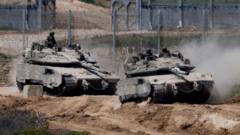Following a two-month ceasefire, Israel's military strategy shifts focus towards a ground occupation to release hostages and combat Hamas, while humanitarian concerns grow amid a blockade.
Israel Escalates Military Offensive Against Hamas in Gaza

Israel Escalates Military Offensive Against Hamas in Gaza
Israel's security cabinet has ratified an expansion of its offensive against Hamas, which includes capturing Gaza territory.
The Israeli security cabinet convened to deliberate on the escalation of military operations against Hamas, marking a significant shift in strategy. The Israeli military is unwinding a two-month ceasefire to intensify pressure on Hamas, officially approving a plan for a prolonged ground operation aimed at controlling more of Gaza.
In a substantial mobilization effort, the military has called up tens of thousands of reservists to support this mission. Significant developments are awaited after U.S. President Trump's upcoming visit to the region, during which Israeli officials may discuss the contentious strategy in more detail.
The Israeli government has signaled a strong intent to seize additional areas of Gaza to create leverage for forthcoming negotiations with Hamas regarding a potential ceasefire and the release of remaining hostages. According to Israeli media sources, Prime Minister Benjamin Netanyahu has indicated this new offensive differs from past operations, outlining a transition from targeted raids to an extended occupation of key territories.
Amid the escalating military actions, voices of dissent are rising domestically. Opposition figures argue that the current strategy is ineffective, highlighting that none of the 59 hostages held since the resumption of conflict have been set free. The Hostages and Missing Families Forum criticized the government's focus on territorial control over the lives of hostages, reflecting a growing discontent from families and among the public.
In parallel, the security cabinet is reportedly considering a proposal to recommence humanitarian aid deliveries, circumventing the two-month blockade that has exacerbated widespread food shortages in Gaza. Humanitarian organizations warn that the plan, which would allow aid distribution through private companies, could contravene essential humanitarian principles, limiting access to vulnerable populations.
As the military campaign intensifies, the Humanitarian Country Team has indicated that Israeli authorities are attempting to alter the existing aid distribution framework, which may jeopardize aid to those most in need. With dire humanitarian conditions unfolding, the UN has emphasized that international law obliges Israel to secure relief efforts for Gaza's 2.1 million inhabitants, amid severe shortages caused by ongoing hostilities.
The backdrop of the renewed offensive stems from a prior Hamas-led attack on October 7, 2023, leading to substantial casualties and hostages. Since the escalation of military actions, Gaza has witnessed over 52,000 fatalities, as reported by the Hamas-run health ministry, fueling an already tense and tragic situation for civilians caught in the crossfire of geopolitical conflict.
In a substantial mobilization effort, the military has called up tens of thousands of reservists to support this mission. Significant developments are awaited after U.S. President Trump's upcoming visit to the region, during which Israeli officials may discuss the contentious strategy in more detail.
The Israeli government has signaled a strong intent to seize additional areas of Gaza to create leverage for forthcoming negotiations with Hamas regarding a potential ceasefire and the release of remaining hostages. According to Israeli media sources, Prime Minister Benjamin Netanyahu has indicated this new offensive differs from past operations, outlining a transition from targeted raids to an extended occupation of key territories.
Amid the escalating military actions, voices of dissent are rising domestically. Opposition figures argue that the current strategy is ineffective, highlighting that none of the 59 hostages held since the resumption of conflict have been set free. The Hostages and Missing Families Forum criticized the government's focus on territorial control over the lives of hostages, reflecting a growing discontent from families and among the public.
In parallel, the security cabinet is reportedly considering a proposal to recommence humanitarian aid deliveries, circumventing the two-month blockade that has exacerbated widespread food shortages in Gaza. Humanitarian organizations warn that the plan, which would allow aid distribution through private companies, could contravene essential humanitarian principles, limiting access to vulnerable populations.
As the military campaign intensifies, the Humanitarian Country Team has indicated that Israeli authorities are attempting to alter the existing aid distribution framework, which may jeopardize aid to those most in need. With dire humanitarian conditions unfolding, the UN has emphasized that international law obliges Israel to secure relief efforts for Gaza's 2.1 million inhabitants, amid severe shortages caused by ongoing hostilities.
The backdrop of the renewed offensive stems from a prior Hamas-led attack on October 7, 2023, leading to substantial casualties and hostages. Since the escalation of military actions, Gaza has witnessed over 52,000 fatalities, as reported by the Hamas-run health ministry, fueling an already tense and tragic situation for civilians caught in the crossfire of geopolitical conflict.




















